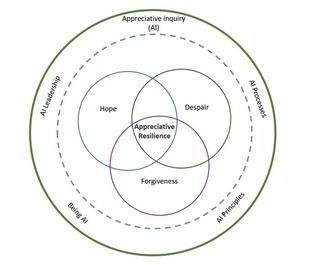Resilience
These Times Call for Perspective
How much space is there between stimulus and response?
Posted April 15, 2020

I explored resilience for several years. It took a lot of reading, research, and thinking to define resilience for myself so that I could write about how to build resilience.
Taken from Victor Frankl’s words, “Between stimulus and response, there is a space and in that space there is the power to choose our response.” I saw resilience as resting in that space.
My book, Unlocked: Discover How to Embrace the Unexpected, gave me the opportunity to use my definition. Focusing on the "decision within the space" from my definition, I defined practices that prepare you to be better prepared for that moment of decision. As I have described in other posts and in my book, these practices are designed to strengthen your sense of identity, deepen your knowledge of possibilities, and nurture a curiosity that energizes the other two traits.
In a recent session, I was introduced to a different interpretation of resilience that deepened my understanding. Jeanie Cockell and Joan McArthur-Blair, the facilitators, led us through an exploration of resilience in something they call Appreciative Resilience which takes into account three layers of human life: despair, hope, and forgiveness while treating them all at once together.
We all find ourselves in times of great hope. At other times, we may be in despair. But this is not a dichotomy as there is a third force in our lives that mitigates throughout our lives: forgiveness. It is in the overlap of all three of these where Appreciative Resilience lies. They call it "appreciative" as their work rests on the principles of Appreciative Inquiry. (See the box for a list and definition of each principle.)
But let me take a moment to offer some insights into Appreciative Inquiry work, where attention is on what is working well. Quick readers often say, "If you only look at the good stuff, it’s just Pollyanna stuff." Don’t be fooled. If you were a cook and noticed that the addition of salt made just about every dish better tasting, you would likely test out using salt in the future as you created new dishes. If you were a pitcher and noticed that you were able to control your pitches so much better when you were relaxed, you would look up ways to relax before every game. If you were a doctor and noticed that a treatment almost always reduced symptoms in an efficacious way, you would continue its application. The appreciative philosophy is about finding and building upon what has been helpful in the past.
Despair
In the present moment, many are wrapped in the tragedy of losing friends or family members or from the fear of losing them. Keeping food on the table or keeping valuable employees or saving a business that has taken years to create are likewise tragedies that create desperation.
Even at this moment, when despair feels as though it will never leave us, using the understanding of AI can allow us to seek out and remember the moments when we overcame other adversities (remember the moments when salt added to the enjoyment of the meal.) And using these memories, we can be heartened to move on.
In my own work, I suggest that people remember the stories from their lives and record them for future review. Writing or reading them over time gives us examples of when we called upon resources we might not have remembered we had. As Cockell and McArthur-Blair said, “Even the tiniest of strengths can carry us through.” And that is resilience. Moreover, the same stories can allow reflection on one’s life to see meaning, another essential ingredient to building resilience even in the midst of great suffering.
Hope
Next, they tackled hope, which calls you to stay in the practice of seeing what is worthy within the despair of any situation, no matter how dire or complex. Frankl says that what makes this possible is finding the meaning of a situation.
That simple word "meaning" was like fresh water after a run. It’s about your vision pulling you toward it, energizing you to move always onward. There was a time when I wasn’t sure why I should talk about vision in a book on resilience. Eventually, I figured it out, but this additional language of linking meaning and hope directly deepened my understanding.
As I thought about the meaning of hope, I began to see why human society needs all generations but in particular, children. They are bundles of hope, spreading seeds of hope wherever they go. In my book, I encourage people to imitate a child’s curiosity as it nurtures that same quality along with the hope the comes from knowing there could be amazing things just around the corner.
Forgiveness
The final piece of the three layers of human life, forgiveness, was for me a final wrapping to despair and hope. Even in hope, you can drag along the injustices that cause despair. It is only when you can release the feelings of injustice, anger, frustration, vulnerability as you ponder an event, a perpetrator, an unfair system, that the freedom gained releases you to be your fullest. Irenaius said, “The glory of God is a man fully alive.” Letting go of things that unforgiveness hangs onto, releasing them through forgiveness, allows us to blossom fully.
As I ponder the work of Cockell and McArthur-Blair, I am able to see resilience in our lives as they do. It’s a different perspective from my own even as their and my works draw both from Frankl’s genius. It was a joy to see that the both/and approach allows both our approaches to resilience to be true and complementary at the same time.
Some questions to ponder
Here are some questions that were suggested by Cockell and McArthur-Blair.
- How can you amplify the tiniest strengths in your despair?
- How do you practice hope and taking on a hopeful view to feed your resilience bank?
- How is practicing forgiveness fostering my resilience through the COVID pandemic?
What are you taking from this new perspective to change how you greet moments that call you to resilience?
Principles of Appreciative Inquiry
The word appreciative comes from the work of Suresh Srivastva and David Cooperrider. It defines a philosophy that builds on generative exploration (enquiry) of the world. It is often referred to as Appreciative Inquiry which is often thought of as a process when, in fact, it is also a philosophy built on principles.
Constructionist – that people working/living together in relationship create the world through their words.
Wisdom of the whole – that our thoughts, words, and actions all work together.
Poetic – that we are able to craft and choose what we see and become; we have agency.
Positive – that with focus on what works well, we can build and sustain long-lasting change.
Simultaneity – that a question and its answering action operate together such that even the most innocent question has agency to provoke change.
Anticipatory – that our visions, our collective imaginations for the future, will guide and energize us just as Aristotle said: “A vivid imagination compels the whole body to obey it.”
References
Blair, Madelyn, 2019. Unlocked: Discover How to Embrace the Unexpected, Pelerei Publishing, Jefferson, MD.
Srivastva, Suresh, DavidL. Cooperrider, and Associates. 1990. Appreciative Management and Leadership, Jossey-Bass Publishers, San Francisco and Oxford.
McArthur-Blair, Joan and Jeanie Cockell, 2018. Building Resilience with Appreciative Inquiry: A Leadership Journey through Hope, Despair, and Forgiveness, Berrett-Koehler Publishers, Inc. Oakland. CA.
Kelm, Jackie Bascobert, 2015. Appreciative Living: The Principles of Appreciative Inquiry in Daily Life, Venet Publishers, Charleston, SC.




